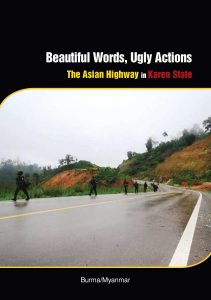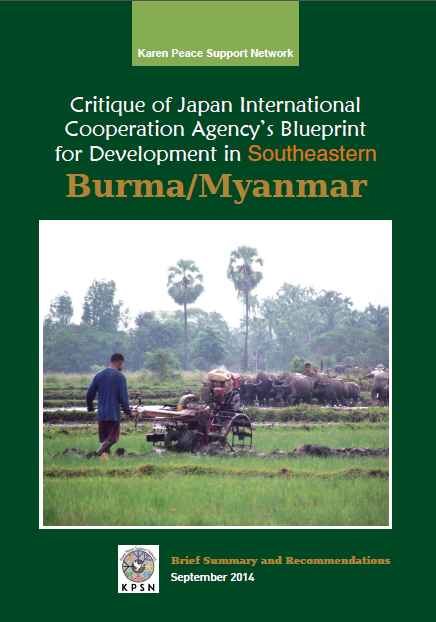Posts Tagged ‘Karen Environmental and Social Action Network’ (9 found)
Beautiful Words, Ugly Actions:The Asian Highway in Karen State, Burma
 This is a joint-report from KHRG, THWEE Community Development Network, and Karen Environmental and Social Action Network (KESAN). It details human rights violations surrounding the construction of the Asian Highway in Thin Gan Nyi Naung to Kawkareik, Dooplaya District, which was completed in August 2015. These violations include the lack of Free, Prior and Informed Consent (FPIC) for affected communities, and armed conflict aggravated by construction, impacting civilians living along the Highway […]
This is a joint-report from KHRG, THWEE Community Development Network, and Karen Environmental and Social Action Network (KESAN). It details human rights violations surrounding the construction of the Asian Highway in Thin Gan Nyi Naung to Kawkareik, Dooplaya District, which was completed in August 2015. These violations include the lack of Free, Prior and Informed Consent (FPIC) for affected communities, and armed conflict aggravated by construction, impacting civilians living along the Highway […]
Submission to the United Nations Universal Periodic Review on Refugees and Displaced Persons Burma/Myanmar
1. This submission focuses on Burma’s compliance with international human rights obligations in relation to Burma’s refugees and displaced persons safe, dignified and voluntary return. It draws on interviews conducted with a mixture of semi-structured individual interviews and focus groups with refugees from Mae La, Umpiem Mai, Ban Nai Soi, and Mae Ra Ma Luang refugee camps including women, youth and religious minority groups, Mon, Karenni, and Karen civil society groups, ethnic armed groups (EAGs), refugee committees, and international non-governmental organizations […]
• • •Network Calls for Significant Problems to be Addressed Before Dawei SEZ Project Revived
Dawei Development Association (DDA) calls on the Myanmar and Thai governments to refrain from reviving the Dawei Special Economic Zone (DSEZ) development project unless the problems associated with the project thus far are remedied and international best practices are in place going forward. The Prime Minister of Thailand, retired general, Prayuth Chan-ocha, is visiting Myanmar this week, as his first overseas visit since taking power earlier this year. The leaders of both countries are due to meet to discuss reviving the stalled Dawei deep-sea port and Special Economic Zone development project […]
• • •Critique of Japan International Cooperation Agency’s Blueprint for Development in Southeastern Burma/Myanmar
The Japan International Cooperation Agency (JICA) has recently issued a blueprint that proposes industrial development in Southeast Burma/Myanmar, purportedly to aid in the return and settlement of refugees and Internally Displaced Persons (IDPs) in Karen and Mon States. However, the Karen Peace Support Network (KPSN), a network of nearly 30 ethnic Karen organizations, cautions JICA that its blueprint for infrastructure development such as roads and industrial estates in the war-torn southeast is premature and flawed, potentially exacerbating conflict in the region.
The KPSN (formerly KCBPSN) is the largest network of Karen civil society organizations in Burma/Myanmar. These organizations have been providing support for vulnerable people in this conflict-torn region for decades, striving to empower local communities, build transparent and accountable institutions, and help create a sustainable peace in Burma/Myanmar. KPSN and its member organizations are important stakeholders which must be included in any development planning process in the Karen areas of the southeast […]
• • •2,000 Karens Gather on the Salween to Call for a Halt to Dam Plans
About 2,000 internally displaced people and villagers from the Wei Gyi area gathered yesterday at Ei Htu Hta Internally Displaced Persons (IDP) camp on the Salween riverbank to mark the International Day of Action for Rivers and Against Dams in an event organized by Karen Rivers Watch […]
• • •Burma Groups Release Concerns and Recommendations on Peace Funds
Burma’s ethnic community and civil society organizations released a position paper today welcoming peace fund initiatives but expressing concerns and recommendations to encourage the funds to support the country’s nascent peace process.
“There are many elements that successful peace funds must include, namely inclusive consultations, engagement with full organizations rather than individuals, equitable natural resource management and land rights, and addressing anxiety over the return of refugees and internally displaced persons,” described Paul Sein Twa […]
• • •Open Letter to Norwegian Ambassador Katja Nordgaard on Myanmar Peace Support Initiative (MPSI) Consultation
Dear Ambassador Nordgaard,
At the outset, we state that we welcome Norway’s MPSI. We view such initiative to have the potential of furthering peace processes, especially in the ethnic areas. As such, consider us as peace building actors and we are willing to provide our support where necessary.
However, we feel Norway is unable to demonstrate a good practice for MPSI consultations […]
• • •KESAN Report Endangered Elephant Need Protection
Today, the Karen Environmental and Social Action Network (KESAN) announces the results of their report, Endangered Elephants in Megatha Forest, Karen State, Burma. KESAN researchers found evidence that Megatha Forest is home to 15-18 elephants in 2-3 small groups of 3-7 individuals […]
• • •Khoe Kay: Biodiversity in Peril
This is the first biodiversity survey of the Salween River in Karen State, and documents 194 plant species and 200 animals, including 42 endangered species. Based on surveys conducted for three months at Khoe Kay, a bend in the river near the Weigyi dam site, it includes comprehensive charts and unique photographs. Download the report.
• • •









 All posts
All posts